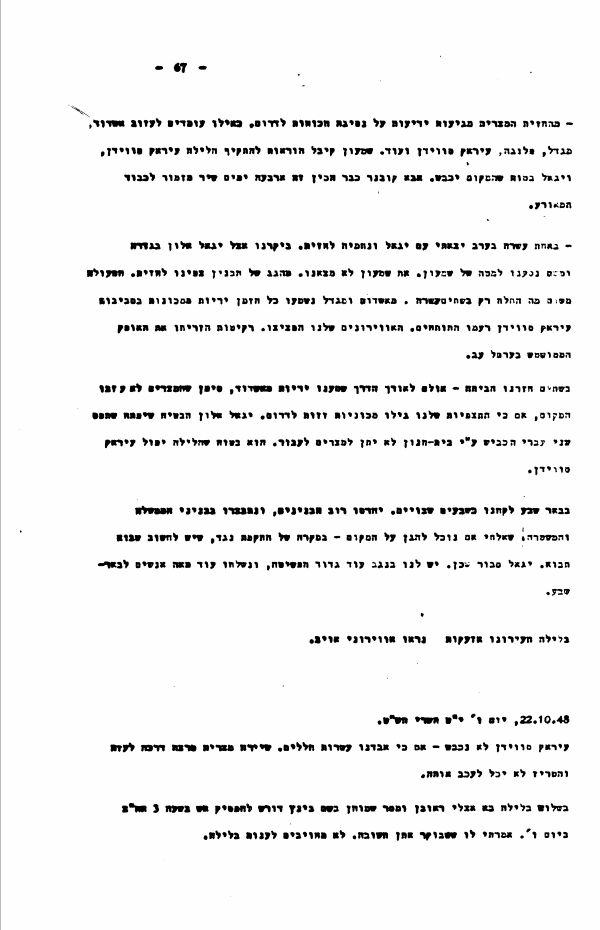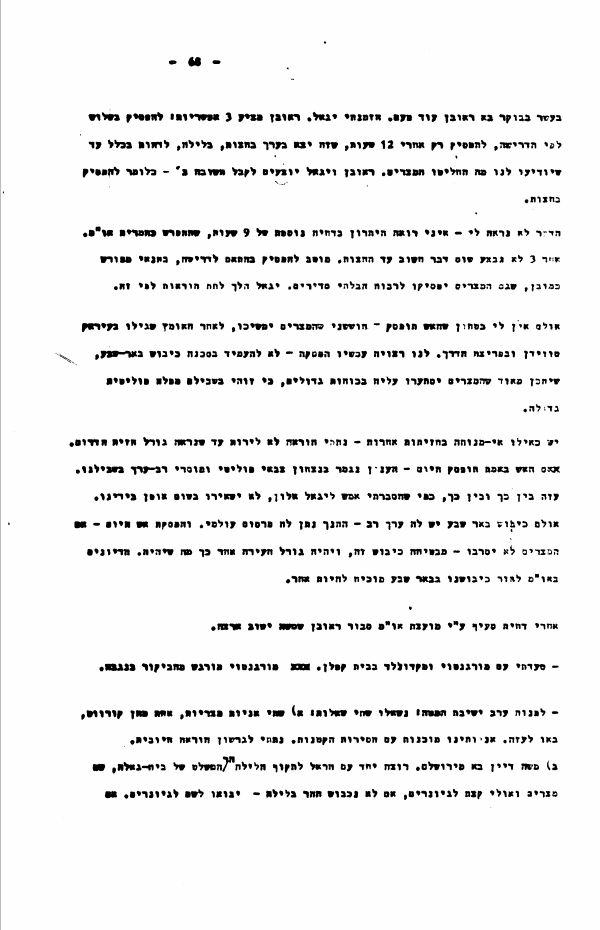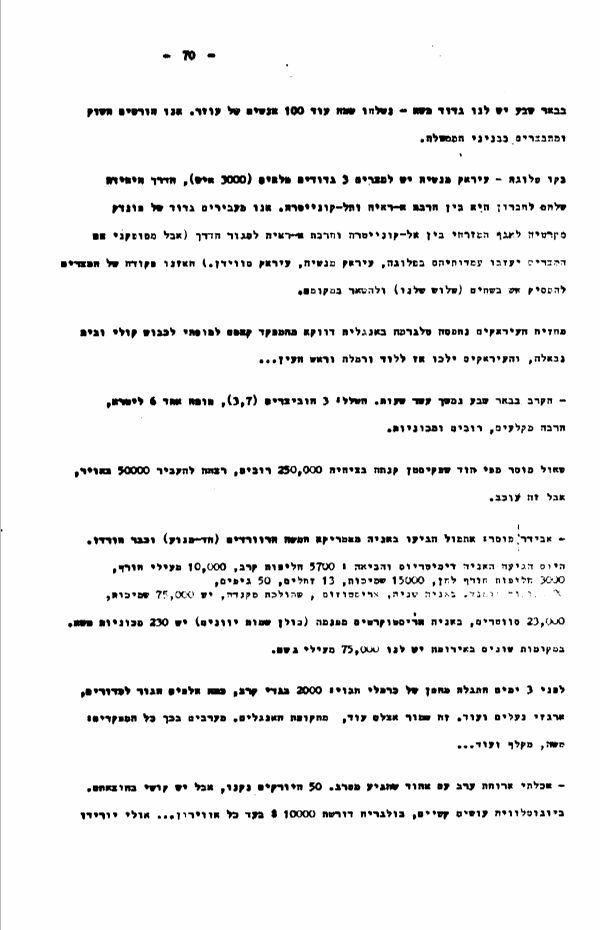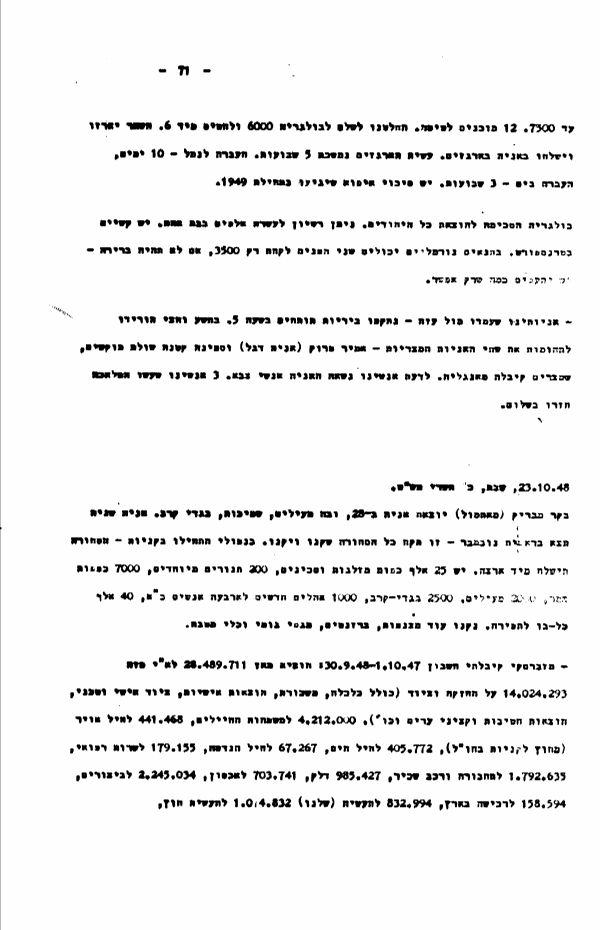1
of
Places:
England
United States
Ashdod
Be'er Sheva
Gaza
Menuh̠a
Bethlehem
Har'el
Negba
Egypt
Ezer
Snir
Migdal
Bet Guvrin
Hebron
Bir Asluj
Sa'ad
Lod
Rosh Ha'Ayin
Ramla
Bulgaria
H̠agor
Canada
Prague
Aseret
Jerusalem
Shamir
Karatiyya
Qula
Czechoslovakia
Yugoslavia
The use of the photograph is subject to the Copyright Law, 2007
21.10.1948
224892
Friday, October 22, 1948 Iraq-Suweidan wasn’t captured – even though we lost dozens of soldiers. An Egyptian convoy broke through to Gaza, and the wedge [in Beit Hanoun] cannot hinder it. At 3 a.m. Reuven [Shiloah] came to see me, and reported that [Dr. Paul] Mohn [of the UN Special Committee on Palestine and later a member of the mediator’s staff], on behalf of [Ralph] Bunche, is calling for a ceasefire at 3 p.m. on Friday [i.e., that day]. I told him I’d reply in the morning. There’s no obligation to reply at night. At 10 a.m. Reuven [Shiloah] came again. I summoned Yigael [Yadin]. Reuven proposes three possibilities: To stop at 3 [o’clock] as demanded; to stop only after 12 hours, which would be around midnight; to reject [the demand] entirely, until they tell us what the Egyptians have decided. Reuven and Yigael advise adopting answer B – that is, stopping at midnight. I don’t see it this way – I don’t see the advantage of an additional delay of nine hours, which would be interpreted as defying the UN. After 3 we won’t carry out anything important by midnight. It’s better to stop per the demand, on the explicit condition, of course, that the Egyptians, including the irregulars, also stop. Yigael went to issue orders in line with this. However, I’m not confident that the fighting will cease – I fear that the Egyptians will continue, after the courage they displayed in Iraq-Suweidan and in breaking through [from Majdal southward]. For us a cessation right now is desirable – [so as] not to endanger the conquest Beersheva, which the Egyptians are very likely to storm with large forces, because for them this is a major political defeat. There seems to be unrest at the other fronts – I issued an order not to open fire until we know the fate of the Southern Front. If the fighting really ceases today – the matter will come to an end with a valuable military, political, and moral victory for us. In any event Gaza, as I explained to Yigal Allon last night, won’t be left in our hands no matter what. But the conquest of Beersheva is of great value – the Bible has given it worldwide renown. And a ceasefire today – if the Egyptians don’t refuse – guarantees this conquest, whatever the fate of the town afterwards. The discussion at the UN, in light of our conquest of Beersheva, will necessarily be different. After the removal of the Eretz-Israel item from the UN [General] Assembly [agenda], Reuven is certain that Moshe [Sharett] will return to the country. – I dined with Morgenthau and [US Ambassador] McDonald at [Eliezer] Kaplan’s home. Morgenthau is excited about the visit to Negba. – In the late afternoon a Staff meeting: two questions were asked: A) Two Egyptian ships, one of them a corvette, came to Gaza. Our ships are ready with the small boats. I gave an affirmative order to Gershon [Zak]. B) Moshe Dayan came from Jerusalem. He wants, along with Harel, to attack the Beit Jala stronghold hill, where there are Egyptians and maybe a few Legionnaires, tonight. If we don’t capture the hill at night – Legionnaires will arrive there. If we capture it, the residents of Sharafat and Beit Safafa will flee, and our situation in southern Jerusalem will improve, and the railway in the north and from the south will also be in our hands. [Yosef] Avidar, [Haim] Laskov, [Levi] Eshkol, Baruch Rabinov, Shlomo [Shamir] were in favor, Aharon [Remez] was hesitant. David Shaltiel, Shaul [Avigur], Yigael [Yadin], Ya’akov [Dori], Reuven [Shiloah] were opposed. I decided against for these reasons: 1) Such an action immediately after a truce is announced will create a bad impression around the world, 2) If we succeed in capturing the place – we’ll have to return it under UN pressure – and it’s not worth losing a single human life over this, 3) A strike against Beit Jala (and Bethlehem) will anger the Christian world, 4) We have no interest at this time in provoking the Legion, which didn’t help Egypt, 5) Such an attack is likely to bring the Legion and the Iraqis into the battle – thwarting the impression that Egypt is isolated and there’s a split in the League, 6) Such an attack would complicate our position of not withdrawing from the places we captured. Moshe Dayan accepted the verdict with understandable sorrow. News came from Moshe Carmel [Northern Front commander] that Qawuqji had captured our strongholds near Manara. He wants to take the strongholds back and launch Operation Snir. Both I and Yigael [Yadin] objected, and he was given an order to limit himself to taking the strongholds this time. It’s necessary to have a gap between one action and another. The action in Iraq-Suweidan tonight failed. We had 28 casualties in the strongholds nearby: 3 killed, 25 wounded, at the police itself 30 casualties (killed and wounded, it’s not known yet how many). All our losses in the action in the south from the start through tonight (not inclusive): 63 killed, 29 missing, 274 wounded, 100 of them severely; including Beersheva: there 8 were killed, 25 wounded – in total there were about 120 killed, and more than 300 casualties. Last night our men captured 3 strongholds between Faluja and Karatiyya, but after a counter-attack – our men retreated. The Egyptians managed to escape Majdal and return to Gaza, despite the wedge [in Beit Hanoun], but we found 20 burnt Egyptian vehicles along the road. Our men seized Beit Hanoun. The enemy forces remained in Ashdod – patrols of ours that tried to approach encountered gunfire. The movement of vehicles from Ashdod to Majdal continues. Yesterday the Egyptians received an order to retreat to Hebron from the Majdal – Beit Jubrin line. We have a force along the route, but in light of the truce an order was issued to the Egyptians to remain in their positions. There’s a danger of an Egyptian breakthrough from Gaza to Beersheva (200 vehicles). They’ll have to pass [break] through Sa’ad and Be’erot Yitzhak. Three battalions can be sent. There’s a company of ours in Sa’ad. It appears that our men have seized Bir ‘Isluj. In Beersheva we have an entire battalion – another 100 men under Uzi [Narkiss, commander of the 7th Battalion in the Negev Brigade] were sent there. We’re destroying the market and barricading ourselves in government buildings. Along the Faluja – Iraq-Manshiyya line the Egyptians have 3 full battalions (3,000 men); their only route to Hebron is Khirbet a-Ra’i and Tel Quneitra. We’re transferring a battalion of [Yitzhak] Pundak’s [from the Oded Brigade] from Karatiyya to the eastern side between Al-Quneitra and Khirbet a-Ra’i to seal off the route (although I doubt the Egyptians will leave their positions in Faluja, Iraq-Manshiyya, Iraq-Suweidan). We eavesdropped on Egyptian order to cease fire at two (our three) and remain in place. A telegram, in English actually, was captured from the Iraqi front, from Commander Qassem [Rimawi, of Deir Balut] to the Mufti, to conquer Qula and Beit Nabala, and then the Iraqis will go to Lod and Ramle and Rosh Ha-‘Ayin… The fighting in Beersheva continued for 10 hours. The plunder: 3 Howitzers (3.7”), one 6-pound cannon, many [light] machine guns, rifles, and vehicles. – Shaul [Avigur] reports on behalf of Ehud [Avriel] that Pakistan bought 250,000 rifles in Czechoslovakia, wanted to transfer 50,000 by air, but this has been delayed. [Yosef] Avidar reports: Yesterday five (single-engine) Harvard planes arrived by ship from America and have already been unloaded. Today the ship Demetrius arrived, bringing: 5,700 battle fatigues, 10,000 winter coats, 3,000 winter uniforms for WC [Women’s Corps], 15,000 blankets, 13 tracked vehicles, 30 jeeps, 20 command machines [weapons carriers]. The second ship, the Aristozeus [sp.], which comes from Canada, has 75,000 blankets, 23,000 sweaters. The Aristocratis, from Panama (they’re all Greek names) has 230 trucks. We have 75,000 raincoats at various locations in Europe. 3 days ago a hidden storage site belonging to Carmeli was discovered: 2,000 battle fatigues, a few thousand belts for bullets, boxes of shoes, etc. They’ve stored this since the time of the English. All the commanders have been involved: Moshe [Carmel], [Mordechai] Makleff, and others… – I ate dinner with Ehud [Avriel], who arrived from Prague. 50 “Spits” were bought, but there’s a problem exporting them. In Yugoslavia they’re making things difficult. Bulgaria is demanding $ 10,000 [transfer fees] for each airplane … They might come down to 7,500. 12 are ready for flight. We decided to pay Bulgaria [$] 6,000 and to immediately fly 6 [of them here]. The rest will be packed up and sent by ship in crates. Arranging the crates takes 5 weeks. Delivery to the port – 10 days, shipment by sea – 3 weeks. So there’s a chance they’ll arrive at the start of 1949. Bulgaria agreed to the departure of all Jews. A permit was issued for 10,000 at once. There are problems with transport. Under normal circumstances the two Pans [the ships Pan York and Pan Crescent] can take only 3,500 if there’s no alternative – need to pile on as many as absolutely possible. – Ships of ours that were positioned opposite Gaza – were shelled by cannon fire at 5 p.m. At 9:30 the two Egyptian ships were downed: the Emir Farouk (flagship) and a small ship, a minesweeper that the Egyptians received from England. According to our men the ship carried military personnel. The 3 men of ours who did the work returned safely.












